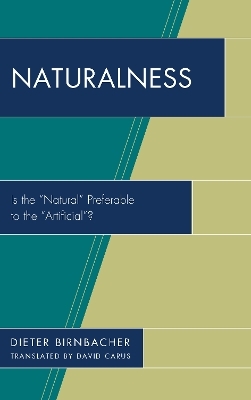
Naturalness
University Press of America (Verlag)
978-0-7618-6349-6 (ISBN)
In Naturalness, Dieter Birnbacher delves into an argument common in everyday thinking and ethics—the argument of naturalness. This argument suggests that what is natural is in some ways superior to what is artificial, due to repeated positive connotations associated with the natural. This book presents both a phenomenology and a critique. For the former, Naturalness reviews the role of naturalistic arguments in various domains of everyday language and reasoning as well as in political and ethical debates, especially regarding controversial issues in preservation. For the latter, it critically discusses the persuasiveness of naturalness, both intellectually and morally, and how it is currently no more than an expression of conservatism and resistance to change in basic orientations.
Dieter Birnbacher is a professor of philosophy at the University of Düsseldorf, Germany; president of the Central Ethics Commission of the Bundesärztekammer (German Medical Association); and a member of Leopoldina, German National Academy of Sciences.
Preface
1. Natural and Artificial: Introductory Distinctions
1.1 Naturalness and Artificiality as Points of Orientation
1.2 Genetic and Qualitative Naturalness
1.3 Dimensions of Naturalness in a Genetic Sense
1.4 Dimensions of Naturalness in a Qualitative Sense
2. Naturalness as a Value
2.1 Has Naturalness become Discredited as a Normative Principle?
2.2 The Naturalness Bonus in Everyday Morality
2.3 Naturalness Arguments in Applied Ethics
2.4 “Natural”: Positive Connotations and their Background
2.5 The Structure of Naturalness Arguments
2.6 The Task of the Following Chapters
3. Naturalness as a Norm
3.1 Nature as a Basis for Moral Norms?
3.2 Is the Argument of “Naturalistic Fallacy” valid?
3.3 Different Approaches to Criticizing Ethical Naturalism
3.4 The Projective Character of Normative Images of Nature
3.5 Learning from Nature
3.6 Conclusions
4. Naturalness in the Ethics of Nature: What Type of Nature is Worth Protecting?
4.1 Naturalness and other Values of Nature
4.2 Can the Value of Protection be Applied to its Necessary Conditions?
4.3 Nature as an Anti-World
4.4 The Conservation of Naturalness in the Genetic Sense: Originality
4.5 Faking Nature
4.6 Naturalness in a Qualitative Sense—an Aesthetic or also an Ethical Principle?
4.7 Does the Recognition of the Value of Naturalness Demand a Non-Anthropocentric Ethic?
4.8 Conclusions
5. To What Extent should we be Allowed to Alter our Individual Natural Contingency?
5.1 The Religious and other Reasons for the Sacrosanctity of Given Nature
5.2 Natural and Artificial: Boundary Issues
5.3 Which Alterations resulting from Intervention are Ethically Problematic?
5.4 Naturalness in Dealing with Ourselves—An Independent Value?
5.5 The “Naturalization” of Human Dignity
5.6 Conclusions
6. Naturalness Arguments in Reproductive Medicine
6.1 Gradations of Artificiality
6.2 What Role do Naturalness Arguments Play in Reproductive Medicine?
6.3 Naturalness Preferences versus Naturalness Principles
6.4 Sex Selection as a Test Case of Biopolitics
6.5 Principles of Naturalness in the Debate on Reproductive Cloning
6.6 The Dignity of the Species and Naturalness
6.7 Conclusions
7. Naturalness as a Boundary to Transforming Human Nature
7.1 The Idea of a Species Ethics
7.2 What does “Human Nature” mean?
7.3 “Posthumanism”?
7.4 The Openness of Human Nature
7.5 Images of Humanity as Intrinsic Values?
7.6 Conclusions
Bibliography
Index of Names
| Übersetzer | David Carus |
|---|---|
| Verlagsort | Lanham, MD |
| Sprache | englisch |
| Maße | 161 x 237 mm |
| Gewicht | 399 g |
| Themenwelt | Geisteswissenschaften ► Philosophie ► Ethik |
| Geisteswissenschaften ► Philosophie ► Logik | |
| Geisteswissenschaften ► Philosophie ► Metaphysik / Ontologie | |
| Geisteswissenschaften ► Philosophie ► Sprachphilosophie | |
| ISBN-10 | 0-7618-6349-4 / 0761863494 |
| ISBN-13 | 978-0-7618-6349-6 / 9780761863496 |
| Zustand | Neuware |
| Informationen gemäß Produktsicherheitsverordnung (GPSR) | |
| Haben Sie eine Frage zum Produkt? |
aus dem Bereich


